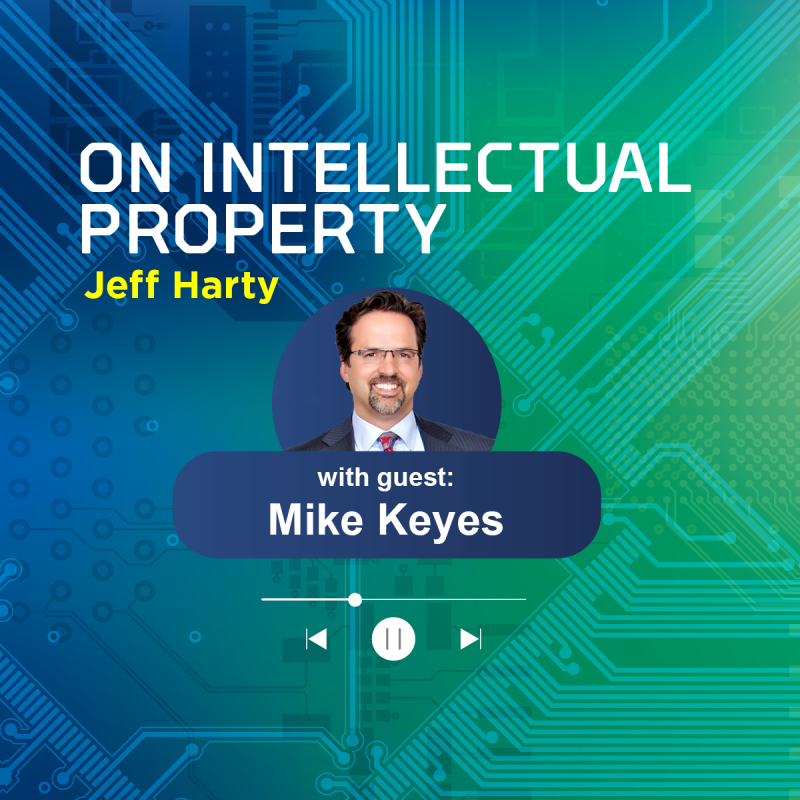
Trademark Surveys: Why, When, and How to Use Them with Mike Keyes
In our innovation economy, trademarks and trademark protection are likely to play a significant role in an intellectual property strategy. We know companies spend lots of time and money investing in brands as they compete for consumer attention and recognition. We also know that surveys play an important role in trademark and unfair competition cases. In particular, that’s because so many inquiries are focused on the perceptions of the average, reasonably prudent consumer. How do we measure that? How do we assess that? It sets the stage for a potential consumer survey, which introduces both technical and strategic questions. Featured guest Mike Keyes is uniquely qualified to help us better understand the effective use of trademark surveys, both from an academic and a practical litigation perspective.
In this episode, Jeff Harty and Mike Keyes discuss:
- The evolution of survey evidence in court cases.
- Common ways surveys are used in trademark and advertising litigation.
- The role lawyers and survey experts play in consumer surveys.
- Why surveys are approachable subject matter and evidence for jurors (and how they can be looked upon unfavorably).
- Hurdles to the admissibility of survey evidence.
Key Takeaways:
- The treatment of expert testimony under Federal Rules of Evidence 702 and 703 contributed to the growth of consumer surveys in litigation, and now it is not unusual for judges to expect to see surveys in Lanham Act cases.
- When it comes to secondary meaning and likelihood of confusion, surveys can be beneficial and can be powerful and persuasive pieces of evidence.
- Different types of trademark survey designs can be used depending on what litigators are trying to show, such as genericism, acquired distinctiveness, or likelihood of confusion.
- There's both art and science to putting together a survey questionnaire that’s clear, concise, and not leading or biasing survey respondents.
“Survey evidence doesn’t show actual confusion—what it’s trying to test for. It’s a tool to assess how consumers’ perceptions are in the real-world marketplace. And because it’s really trying to get at that issue, it’s important to replicate marketplace conditions in terms of how consumers encounter the marks at issue during the survey process.” —Mike Keyes
About Mike Keyes:
Mike Keyes is the co-head of Dorsey’s trial group and a go-to intellectual property and commercial litigation trial attorney with a vast reservoir of experience in cases involving trademarks, copyrights, and false advertising, including individual consumer and class action claims. Mike and his team have represented some of the world’s most recognized brands and companies in high-stakes litigation in federal courts across the country including Washington, Oregon, California, Colorado, Minnesota, Illinois, New York, Massachusetts, Utah, and Florida. These disputes have encompassed subject matters including medical diagnostics software, online games and apps, Google Ads, social media, e-books, consumer products, food and beverage, fashion, sports equipment, educational testing tools, and hospitality services.
Connect with Mike Keyes:
Website: https://www.dorsey.com/
LinkedIn: https://www.linkedin.com/in/mike-keyes-7b6a134/
Email: keyes.mike@dorsey.com
Connect with Jeff Harty:
Website: https://nyemaster.com/attorney-directory/jeffrey-d-harty/
Email: jharty@nyemaster.com
LinkedIn: https://www.linkedin.com/in/jeff-harty-5a9a1643/